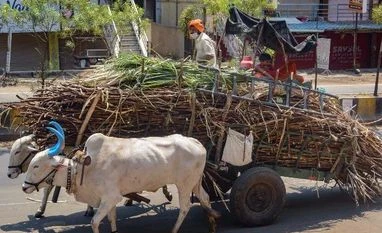Jagannath, a marginal farmer from Malhargarh town in Mandsaur district of Madhya Pradesh, the epicentre of a farmers’ agitation a few years ago, has faced a peculiar problem over the past few weeks since the 21-day nationwide lockdown to check the spread of Covid-19 was imposed.
Heightened police scrutiny of his movements. “Though the government exempted farming and harvesting operations from the lockdown, we have to convince the local constable every time we go out that it is to work in the fields and nothing else,” Jagannath says.
Shenu Agarwal, chief executive officer of Escorts Agri-Machinery, one of the largest farm equipment makers in the country, says his firm’s employees and dealers, too, face a similar problem.
“Though the central and several major state governments have issued orders exempting farm equipment repair shops and retailers from lockdown, on the ground a lot of challenges remain and getting curfew passes for our dealers from district magistrates or collectors is a big problem,” Agarwal said.
He said harvesting of rabi crops was underway in Haryana, Uttar Pradesh, Bihar, Rajasthan and Madhya Pradesh, where agriculture machine repair and retail shops are vitally important to enable smooth harvesting operations.
There are around 10,000 farm equipment retailing and manufacturing shops across India in the organised sector, while thousands of others exist in the unorganised space. The Ministry of Home Affairs (MHA) in an order issued last week exempted all sorts of agriculture machinery repair and retail shops from the lockdown.
Amid speculation that the lockdown could be extended, several relaxations given over the past few days need to be clearly conveyed to ground-level authorities to ensure that they are implemented in letter and spirit or else farming operations could get impacted.
Escorts on its part has lined-up a crack team of 10 senior officers who are daily in touch with district officials in various states to see that shops get curfew passes and requisite permission to operate.
“UP has started a very unique system of centralised application for curfew passes and permission to open the shops, while in other states either the dealers themselves or team members assigned have to get in touch with local authorities to see that policemen don’t needlessly harass the tractor shop owners,” Agarwal said.
Amit Saraogi, managing director of Anmol Feeds, a major animal feed maker, said another problem was the difference in the way various state governments interpreted the rules.
Saraogi says lack of information at the ground level about the exemption for movement of animal feed — fish, cattle and poultry feed — was making it difficult to work.
“Though fish feed has been classified as an essential commodity and exempted from the lockdown, some state governments hadn’t notified them separately as a result of which one of our trucks carrying fish feed was stranded at the Assam border a few days back,” he said.
Saraogi said sometimes state and district authorities have to be informed separately of the relaxations. “Human beings can remain without food for a day but poultry can’t remain without food for more than four hours,” he said.
Farmer leaders also say that though movement of big harvesting equipment such as threshers and harvesters have been allowed, they are subjected to numerous checks while crossing from one state to another, which delays their movement.
“If you ask me, in most places, 40 per cent shops selling seeds, fertiliser or even farm equipment have opened while the rest are closed despite exemption,” said Gurnam Singh Chaduni, Haryana president of Bhartiya Kisan Union said.
He said if someone needs to get a tractor spare part from the city to mend their broken vehicle they are stopped at 10 places. “How many farmers will like to face this,” Chaduni said.
The movement of combine harvesters and threshers hasn’t yet started in full swing, which can impact harvesting of wheat in Haryana, which is readying to harvest a big wheat crop, he said.
Union Agriculture Minister Narendra Singh Tomar, meanwhile, on Tuesday held a videoconference with senior officials to ensure that farmers don’t face any difficulty in movement of equipment needed for harvesting, transportation of harvested produce and other shops retailing seeds and fertilisers.
Lockdown won’t impact farmers: NITI Aayog member
The government has taken several measures to safeguard farmers from any adverse impact of the ongoing lockdown, and the farm sector is expected to report a growth of little more than 3 per cent in the financial year 2019-20, NITI Aayog member Ramesh Chand said on Tuesday.
In an interview with PTI, Chand said the government had taken measures so that markets work normally during the lockdown period.
“The government has responded to the situation. No restriction is put on farmers in going to field and undertaking agriculture operations. So, all those states which are following these guidelines, I do not think there will be any adverse impact on the farmers,” he said.
The country is under a 21-day lockdown to curb spreading of coronavirus. On the first day of the countrywide lockdown, Chand said some reports came that farmers had to throw their perishable produce on the road.
“After states issuing order and the district administration allowing movement of machinery transport, etc. I see that after first day, we will not have any adverse impact on agriculture or farmers,” the member said. PTI
Unlock 30+ premium stories daily hand-picked by our editors, across devices on browser and app.
Pick your 5 favourite companies, get a daily email with all news updates on them.
Full access to our intuitive epaper - clip, save, share articles from any device; newspaper archives from 2006.
Preferential invites to Business Standard events.
Curated newsletters on markets, personal finance, policy & politics, start-ups, technology, and more.
)